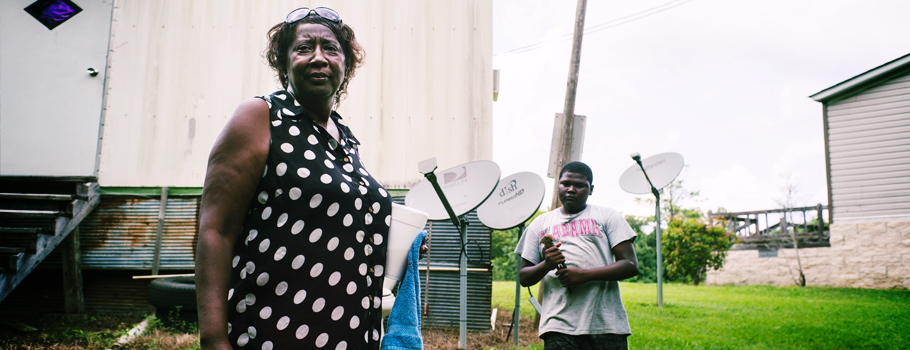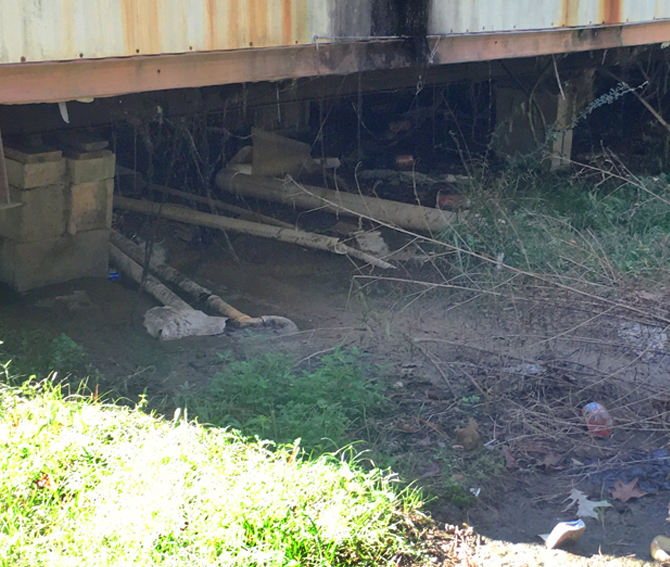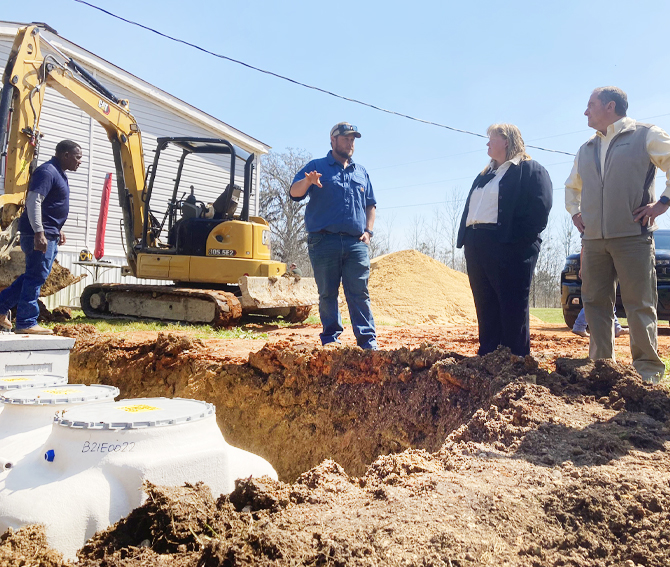LIXIL makes pioneering water and housing products that solve everyday, real-life challenges, making better homes a reality for everyone, everywhere.
- Global Site
-
- English
- Japanese
- Brand Sites
Global
- Global Site
-
- English
- Japanese
- Brand Sites

“I had to choose between buying Christmas presents for my grandchildren or using the money to get the septic tank flushed to prevent raw sewage backing up into my home.”
This dilemma, faced by Lowndes County resident Perman Hardy, describes an issue that affects many people in Alabama’s Black Belt region1 and across the US, from New York and Michigan to Nevada and Hawaii.
Surrounded by trees and wildlife, Lowndes County’s rustic landscape is dotted with low-income rural communities in which about 80% of homes have no connection to a centralized sewer system. These households, like 25% of the US population, are responsible for their own onsite wastewater systems and shoulder the associated costs.
Another problem is compounding the situation. The high clay content of the region’s prairie soil, for which the black belt is named, prevents effluent from traditional systems, such as septic tanks, from draining properly. In heavy rain, which is common in the region, septic tanks can overflow, leading to raw sewage flooding into homes.
Residents have been experiencing such sanitation issues for decades, with each new generation learning to live with the problem. Today, Hardy is campaigning for change – and she has joined forces with the Alabama Department of Public Health, the University of South Alabama, LIXIL, and other partners to find solutions.
Safer Sanitation
The cost of buying and maintaining a traditional septic tank system not only exceeds the budget of most households in Lowndes County, but in most parts of the region traditional sanitation solutions will not work. Advanced systems designed to cope with prairie soils are even further out of reach. This has led many to a practice called straight-piping, in which untreated sewage is diverted out of the home via a plastic pipe right into the backyard or nearby woods.
More than a third of homes in the county have raw sewage on the ground, and those who have some form of a system are spending inordinate amounts to maintain and keep some semblance of a sanitation system for their family.

Lowndes County’s wastewater infrastructure issues underscore a wider problem in the country. Across America, an estimated 2.2 million people live without running water and basic indoor plumbing2, according to a report from nonprofit DigDeep. But while the problem may not be restricted to Lowndes, safer sanitation solutions could be born there thanks to a collaboration between LIXIL, the Alabama Department of Public Health and the University of South Alabama.
“I have been working to address the complex sanitation challenges in the Black Belt for many years,” says Kevin White, Part-time Professor, Civil, Coastal and Environmental Engineering, University of South Alabama. “I’m happy to say, with the help of many, we are making progress to improve people's lives. It's going to take a commitment of the many stakeholders to truly have an impact.”
“This can be fixed,” adds Sherry Bradley of the Alabama Department of Public Health. “But it’s going to take a group effort.”
Promoting Partnership
In 2016, the wastewater crisis in the Black Belt came to the attention of Troy Benavidez, Leader, Strategic Partnerships, LIXIL Public Partners, when he read about the problem and visited Lowndes County.
He along with a team of engineers, designers and researchers met people who described teaching their grandchildren to listen for gurgling sounds in the pipes that signify raw sewage is about to back up into the bathtub; who talked about putting toilet paper in the wastebasket to avoid overburdening their fragile sanitation system; who spoke of keeping windows closed in the hot summer months to shut out the smell.
LIXIL was the first company to lend support to the project that followed. It brought on additional partners including the International Association of Plumbing & Mechanical Officials, and wastewater treatment manufacturer FujiClean.
“We’re involved in this because we have the capability and know-how to help solve these major sanitation and water problems,” Benavidez says. “LIXIL has been working around the world to solve sanitation challenges, but we didn’t expect to have to do this work in the US.”
Tailored Solutions

A 100-home pilot study is under way in Lowndes County to test the viability and scalability of a range of solutions tailored to individual households’ needs. One of these potential solutions is FujiClean’s advanced wastewater system, a compact single tank system with multiple chambers. Flow is directed inside the unit to use both mechanical filtration and natural biological processes to breakdown wastewater.
LIXIL has also supplied water-efficient fittings and fixtures to the project, which have cut residents’ water bills and, importantly, put less water into the system for processing. “Managing water is the biggest challenge so putting less water into the system will ease the burden on the system while also saving people money on their water and energy bill. Those savings can be significant.” Benavidez says.
The trial started with a $2 million US Department of Agriculture grant. With a now proven model, the state of Alabama has since received $122 million from the US Infrastructure Law fund3 to help extend the program’s benefits to other communities across the Alabama Black Belt.
“The intent with this pilot project is to demonstrate a process that will work, and products and systems that will work. Then we can use federal funding on a proven model that can be scaled to have the biggest impact,” says Benavidez.
Driving Progress
The project is one of many in which LIXIL is working with government, NGOs and academic institutions to resolve water and sanitation challenges in disadvantaged communities. And on-the-ground experiences in Lowndes County led the company to seek out new ways of working with governments.

“LIXIL is purposefully working differently with the public sector,” Benavidez explains. “Our goal is to partner with government, contributing our knowledge, expertise, capability, technology, and innovation to help solve some of the most challenging water, sanitation and hygiene issues.”
Resolving major challenges such as those facing people in the Black Belt, and many other places across the US, is a complex process. However, private companies can play an important role in making better homes a reality for everyone.
“A lot of people have said this program is the best thing that could have happened,” Hardy says of the Lowndes County project. “It gives communities hope that their living conditions can improve.”
Our Stories
- Backing People and Passions to Drive Innovation
- How Toilets in Schools are Catalyzing Change in Communities
- Building the Future by Recycling the Past
- Reinventing Consumer Connections in the World's Largest E-commerce Market
- Tackling Household Water Inefficiency in a Water-Stressed World
- Plugging the Plumber Shortage
- Pioneering Solutions to a Sewage Crisis in Rural Alabama
- Meet the Citizen Developers Changing How We Work
- Design and Brand Identity Transformation at LIXIL
- Three Changes to Prepare Europe’s Sanitary Industry for Growth
- Three Steps to Creating an Inclusive Culture
- From Linear to Circular: Giving Products in Your Home a New Lease of Life
- Crafting Unique Experiences as well as Products
- GROHE X: A Digital Brand Experience
- Design-led Innovation Delivering True Value
- Responsible Use of Plastics
- Empowering our People for an Agile Future
- Turning the Waves of Change into Opportunities
- SATO Tap: a New Handwashing Solution for All
- New Ways of Working Take Flight at LIXIL
- INAX: Rituals of Water
- Refreshing our sanitation targets, standing firm on our commitments
- Developing Attractive and Differentiated Products
- Conserving Water: The New Normal
- Insulating For a Warmer and Healthier Home
- Open Kitchen, Open Communication
- Tackling Open Defecation in India
- Shaping the Future of Faucets, One 3D Layer at a Time
- Bathed in Culture and Tradition
- Remodeling the Housing Market
- LIXIL's AQUA CERAMIC makes bathroom stains a thing of the past
- The Technology of Water
- Tackling Challenges in Global Sanitation and Hygiene
